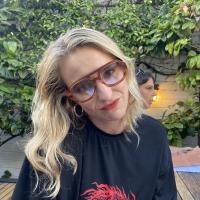Road Kill
We came up here all the time when I was a kid, when there were redwoods so big around they could make dancefloors out of their cross sections. And there were caverns with rivers running through them that we’d paddle around in, gazing up at the great stone teeth above us, struck stupid, while we bruised our knees on stalagmites under the water and imagined we were held in a dragon’s mouth. The water was cold and tasted like minerals and trout and the disappointment of the gold miners whose reed-choked waterwheels we sometimes found the skeletons of and rode like ferris wheels.
In the shade of a manzanita, we’d rest our heads on the earth and point up at the dead wood twisted together with the living, white and red like an arm with the skin peeled back, which made the air smell like artichokes in the dusty heat. The Tuolumne people chewed its leaves for medicine and the black bears remembered this and favored its berries.
Maybe you’re lucky you never saw it like that. If you had, you wouldn’t think it beautiful now. You wouldn’t like playing Captain on the seas of grass. I no longer consider the grass a living thing. It’s only the symbol of everything that’s died.
Hoofing it to Red’s ranch took me three hours. I choked on dust. I rubbed my palm against my face and came away with a handful of dirty dead skin. The old cinema marquee lay coiled and warped in the road. I tried to decipher the confetti of its lettering to see whether the people inside had been laughing or crying when the world ended.
In the empty distance of the aftermath, everything was heat waves, tsunamis of heatwaves, so that a lone and broken telephone pole far away looked like a crinkle-cut french fry, which is another wonderful thing you’ve never had.
I turned over the things Red had told me. It was the first I’d heard of anything outside of the Sierra Nevadas in a couple of years. Idiotically, we’d all assumed that if anybody out there had the resources to save us, they would. At the beginning, we all kept expecting big crates of candy and condoms to rain down on us from planes branded with the flags of countries we’d been wiping our boots on for centuries. But if the rest of the world thought at all about what happened to us, it was probably with relief.
Australia was the Sahara and the Sahara was the surface of Mars—the heat of the sand melted camels from the hooves up like army men in a frying pan. Siberian prison camps were renovated into resorts for wealthy tourists seeking moderate climates.
With God’s drunken hand in the bingo cage, there couldn’t help but be a few places carrying on better than before. Switzerland was growing bananas and yams. Alaskans and Yukoners were planting tobacco and cotton. “And Iceland,” said Red, shaking sweat in my face, “grows wheat. And you know who eats wheat? Cows.”
“Good thing the rich didn’t have to travel too far,” I said. I shouldn’t have been surprised that there were contemporary Caligulas out there, traveling around on chariots yoked to the necks of people like me. But I couldn’t stop watching Red’s hand moving over the animal’s neck, the muscles smooth and perfect, tensing suddenly where flies landed. His hand, stroking. His clean fingernails.

Kim Carson Bodie is an American journalist living on unceded Whadjuk Noongar Boodja land. She has worked a lot of odd jobs and lived a lot of odd places. This is her creative debut. You can find Kim on Instagram @all.is.gravy and she recommends you donate to buglife if you don't want to end up like the characters in this story.


